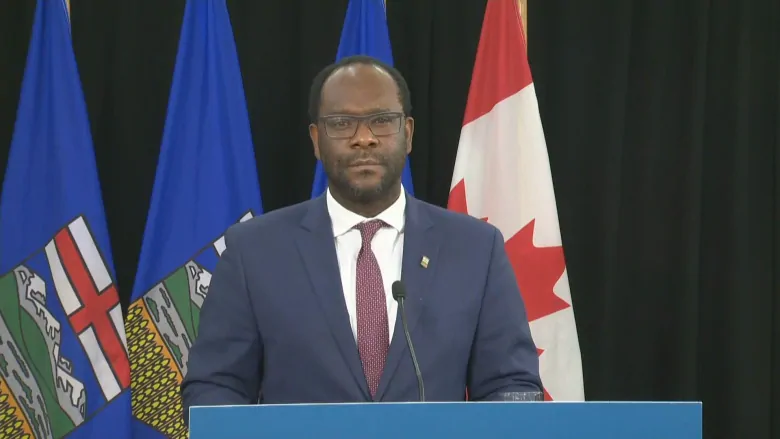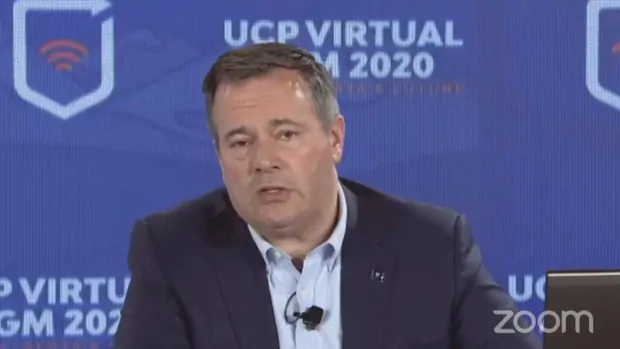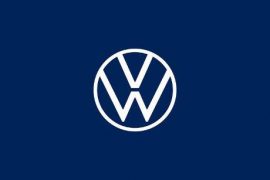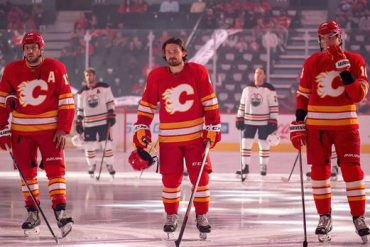Alberta’s premier has no appetite for shutting down restaurants and bars again due to the pandemic.
Addressing the United Conservative Party faithful at the party’s virtual annual general meeting on Saturday, Premier Jason Kenney said about three per cent of positive tests for COVID-19 can be tied to exposure in the hospitality sector.
“We have [NDP Leader] Rachel Notley calling for new restrictions on restaurants and bars. That’s based on politics and not public health data,” Kenney said.
“I give my absolute commitment to that sector that is struggling, that, barring some absolute catastrophe, which we do not see, there is no likelihood of restrictions on their ability to operate like we had in the spring, and I do not see any data to support that.”
Alberta has continued to hit record COVID-19 numbers throughout this past week, reaching a high of 3,651 active cases on Friday.
During the past month, jumps in the number of diagnosed cases of COVID-19 have prompted the Ontario and Quebec governments to stop indoor dining in restaurants in Toronto, Montreal, Ottawa and Quebec City.
According to industry group Restaurants Canada, a survey last month found employment in the industry was still 21 per cent below February 2020 levels. They estimate the sector lost about 260,000 jobs due to the pandemic.
Inquiry report delayed until new year
Also on Saturday, Kenney said the Alberta government will be waiting until 2021 to see commissioner Steve Allan’s report from his public inquiry into alleged foreign funding of Canadian environmental campaigns.
The inquiry, which began in July 2019, was initially supposed to report back to the energy minister by July 2020. Commissioner Allan requested a four-month extension and bigger budget. Findings from the $3.5-million inquiry were due Oct. 30, but Allan recently said he couldn’t meet that deadline, either.

Allan is supposed to investigate whether foreign actors are conspiring to besmirch the reputation of Alberta’s oil and gas industry. Some environmental groups have refused to participate in the process or say they haven’t been contacted for information.
Kenney also updated party members on the activities of the Canadian Energy Centre, colloquially called the oil and gas “war room.” The $30-million private corporation, which is completely funded by the provincial government to correct alleged misinformation about the industry, will soon run advertising campaigns in British Columbia, the United States and Europe, Kenney said.
Legislation coming to restrict foreign political donations
The premier also said bills are coming next year on two more United Conservative Party platform promises.
Kenney said legislation will ban foreign entities from financing third-party advertisers, also called political action committees (PACs), to prevent election meddling.
Also coming will be the Freedom to Care Act, which would allow charitable and non-profit organizations to apply for exemptions from regulations and other legal requirements that stand in the way of them doing good work, Kenney said.
Both Kenney and Justice Minister Kaycee Madu delivered speeches with optimistic and rallying tones at the second weekend of party’s first virtual annual general meeting. The usual revelry of gathering in person for a political convention was set aside to follow public health guidelines. Members debated and voted on resolutions last weekend.
Madu, the only UCP MLA elected within the city of Edmonton, said the NDP take their hold on city ridings for granted. The party wins when members organize and show the value of contributions from minority communities, he said.
Madu said a diversity of thought within the party is a strength, and implored members not to let healthy debate devolve into infighting.
“Our party is truly universal,” he said. “We do not judge where you are, or who you worship, or who you love or where you come from.”

Viewers also heard from Conservative Party of Canada leader Erin O’Toole and his former federal party leadership competitor and Ontario lawyer, Leslyn Lewis.
Both took aim at the federal Liberal government, blasting its approach to Alberta’s oil and gas industry and its handling of the pandemic.
When asked if he would support Alberta separation should the federal Liberals win another election, Kenney dismissed the idea. That’s not the approach in his party’s policy, and it wouldn’t be good for Alberta, he said.
Such a move would push Alberta out of international trade agreements it relies on and could potentially scare investors out of Alberta and injure real estate prices.
“I just ask you to study what happened in Quebec in 1976,” he said, referencing the election of the separatist Parti Quebecois government.
About 1,400 people registered for the party’s annual meeting.

Devoted web advocate. Bacon scholar. Internet lover. Passionate twitteraholic. Unable to type with boxing gloves on. Lifelong beer fanatic.





